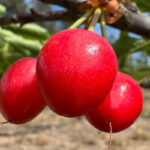Belarus implements embargo on food imports from various countries

On Dec. 6, Belarus implemented an embargo on food import into the country for food products originating from the EU, the UK, Norway, Iceland, Switzerland, North Macedonia, Albania, the U.S. and Canada.
Fruit and vegetables are included in the list along with other food categories such as meat, dairy products, and confectionery products while excluding seeds.
Following the publication of Belarus Decree Nr 700, Belarus will impose - as of Jan. 1, 2022 and for a period of 6 months - restrictions on its import of fruit and vegetables.
The Belarus embargo will concern around 400,000 to 500,000 metric tons of fresh produce export from the EU, affecting primarily apples, pears, strawberries, and tomatoes.
The new embargo will impact the whole European fruit and vegetables supply chain and a direct business value of around 300 million euros, a Freshfel Europe reaction stated.
Freshfel Europe, on behalf of the European fresh produce sector, is expressing deep concerns about the far-reaching implications of this new restriction.
It stated that this ban is challenging about 10% of current EU exports which are also under pressure due to multiple factors such as SPS hurdles and growing protectionism but also new COVID constraints.
Philippe Binard, General Delegate of Freshfel Europe, stated: "Once again, European fruit and vegetables are the hostages of international geopolitical disputes."
The EU remains the single largest import market in the world, with the import of more than 16 million tons.
Freshfel Europe has also denounced on numerous occasions these SPS restrictions imposed on the international trade of fruit and vegetables and the lack of reciprocity in market access conditions.
Binard said the fresh produce sector is eager to see the Russian market reopen soon and that in recent years, the EU started to witness Russian export of several vegetables to the European Union, namely cucumbers and tomatoes.
"The volume imported by the EU from Russia experienced a rapid growth and is now already reaching close to 40,000 metric tons, mainly produce grown from seeds originating from the EU and carefully excluded by Russia and Belarus from their embargo list.”














































